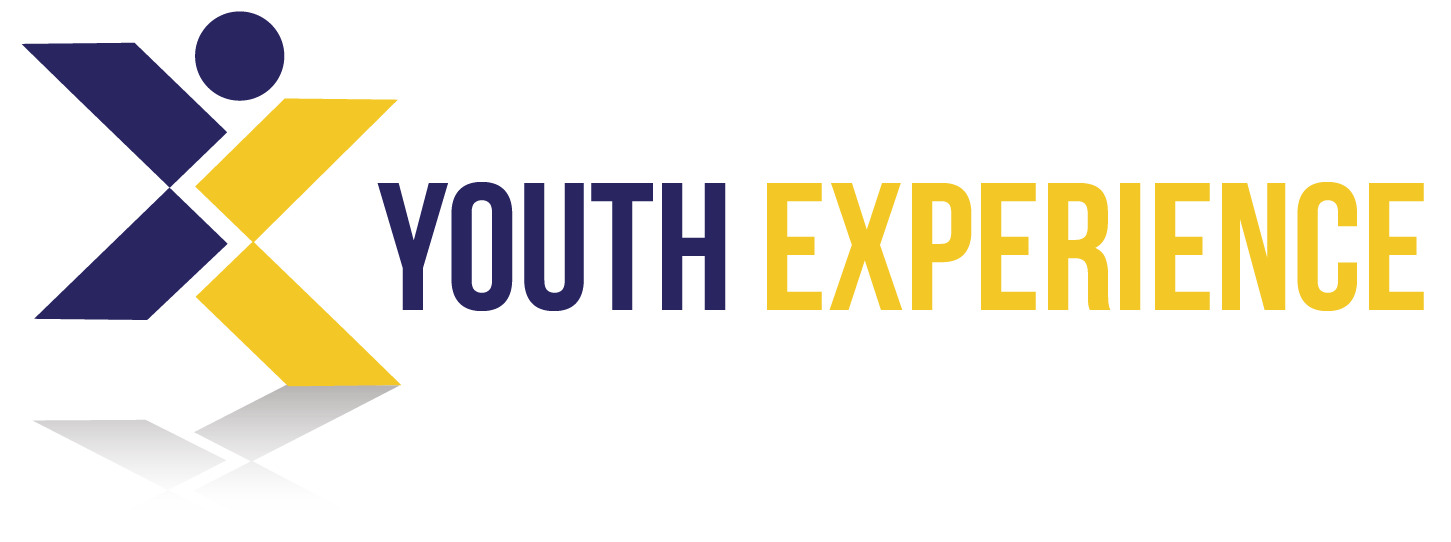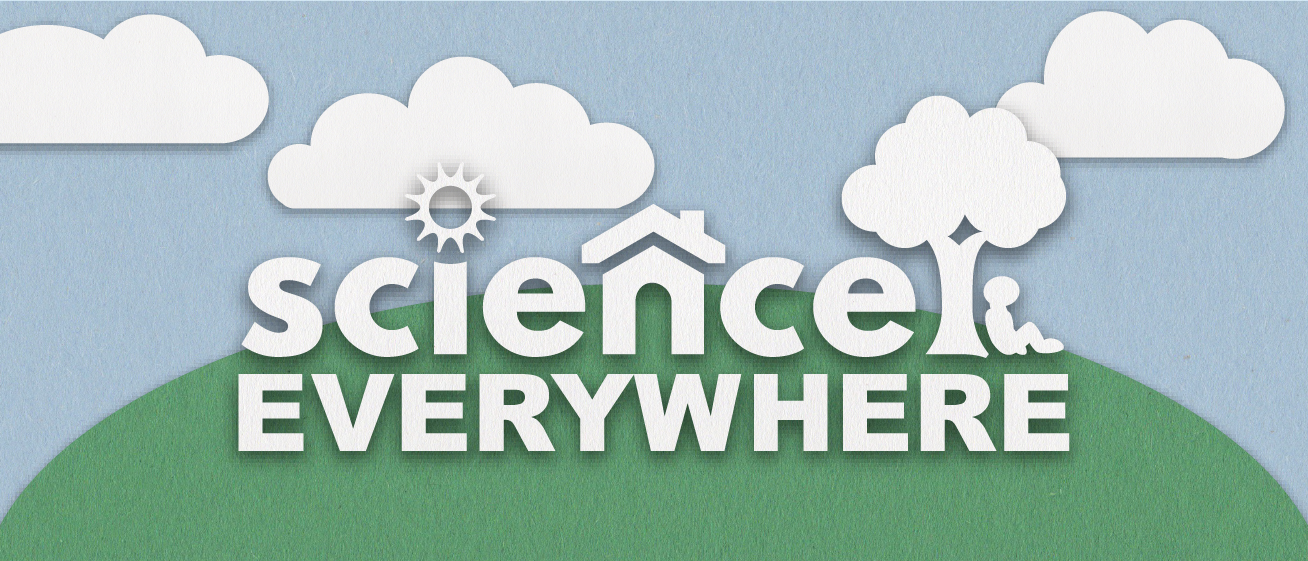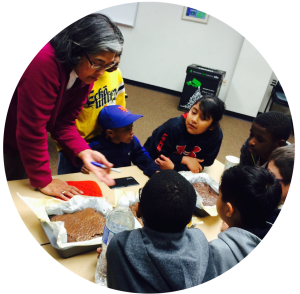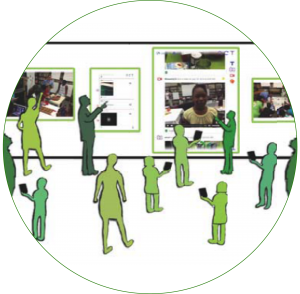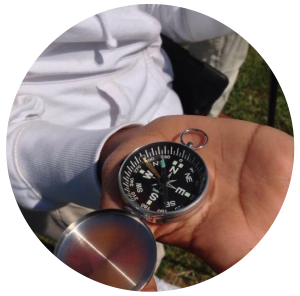Engaging entire neighborhoods in science learning with technology
Science Everywhere was an NSF funded research study aimed at understanding how technology can engage entire communities in science learning. We utilize a design-based research approach in which we co-design innovative science learning technology with families, teachers, and leaders in a community, implement that technology in the community, and then redesign that technology in an iterative design process. Broadly, this study will contribute to theory on connected learning by developing an understanding of how to connect science learning at home, school, and community spaces with technology. This study also aims to contribute to our understanding of parent-child learning, interactive display design, and social media for learning.
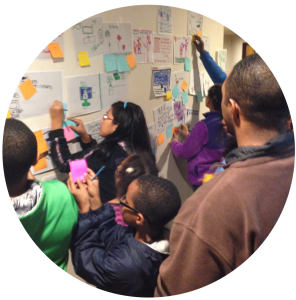
Co-Design with Families
In our Science Everywhere design sessions we work with parents and children from our communities to co-design technologies for science learning. These families help us understand the process of making connections from school to home and the dynamics of parent-child and peer-to-peer learning.
Partners and People
We partnered with several groups to make Science Everywhere a possible. These organizations included the University of Maryland iSchool and College of Education, the University of Washington iSchool, Prince George’s County Public Schools, Solid Rock Church, Highline Public Schools, and KidsTeam UW. The principal investigators of this study include Dr. June Ahn and Dr. Tamara Clegg from the University of Maryland, and Dr. Jason Yip from the University of Washington.
Other members of the research team include:
Dr. Elizabeth Bonsignore, Assistant Research Scientist and Director of KidsTeam at UMD iSchool
Dr. Kelly Mills, UMD College of Education
Dr. Jochen Rick, designer and developer
Dr. Judith Uchidiuno, CMU
Janet Bih, PhD student at UMD College of Education
Daniel Pauw, PhD candidate at UMD iSchool
Caroline Pitt, PhD candidate at UW iSchool
Austin Beck, Master student at UMD College of Education
Past research team members:
Meridian Witt, Media Arts student at Wellesley College
Videos
Papers, Posters, and Presentations
- Bih, J., Pauw, D., Clegg, T., & Weintrop, D. (2020). Building for robots: An alternative approach of combining construction and robotics. In Proceedings of Constructionism 2020 Conference (pp. 170-180).
- Mills, K., Bonsignore, E., Pauw, D., Pitt, C., Hernly, K., Cabrera, L., Jeong, H., Yip, J., Ahn, J. & Clegg, T. (2019). Eliciting Scientific Funds of Knowledge Through Social Media Sharing in Formal Learning Environments. American Education Research Association Annual Conference. Toronto, Canada.
- Mills, K., Bonsignore, E., Clegg, T., Ahn, J., Yip, J., Pauw, D., Cabrera, L., Hernly, K., & Pitt, C. (2019). Connecting children’s scientific funds of knowledge shared on social media to science concepts. International journal of child-computer interaction, 21, 54-64.
- Ahn, J., Clegg, T., Yip, J., Bonsignore, E., Cabrera, L., Mills, K., Pauw, D., & Pitt, C. (2018). Designing Interactive Public Displays for Neighborhood Scientizing. Proceedings of the 2018 CHI Conference on Human Factors in Computing Systems. New York: ACM.
- Cabrera, L., Ahn, J., Yip, J., Clegg, T., Hernly, K., Bonsignore, E., Pitt, C., & Pauw, D. (2018). Exploring practices on the move: Facilitating learning across a neighborhood. Proceedings of the Thirteenth International Conference of the Learning Sciences – ICLS 2018. London, UK: International Society of the Learning Sciences.
- Mills, K., Bonsignore, E., Clegg, T., Ahn, J., Yip, J., Pauw, D., Cabrera, L., Hernly, K., & Pitt, C. (2018, June). Designing to illuminate children’s scientific funds of knowledge through social media sharing. In Proceedings of the 17th ACM Conference on Interaction Design and Children (pp. 266-277).
- Ahn, J., Clegg, T., Yip, J.,, Bonsignore, E., Pauw, D., Cabrera, L., Hernley, K., Pitt, C., Mills, K., Salazar, A., Griffing, D., Rick, J., & Marr, R. (2018, April). Science Everywhere: Designing Public, Tangible Displays to Connect Youth Learning Across Settings. In Proceedings of the 2018 CHI Conference on Human Factors in Computing Systems (p. 278). ACM.
- Uchidiuno, J., Clegg, T. L., Ahn, J., Yip, J. C., Bonsignore, E., Pauw, D., et al. (2017). Learning about Learning through Participatory Design with Families. In B. DiSalvo, J. C. Yip, E. Bonsignore, & C. DiSalvo (Eds.), Participatory Design for Learning. New York, NY.
- Clegg, T. L., Preece, J., Pauw, D., & Warrick, E. (2016). Environmental learning through the lens of affinity spaces: Transforming community members into a community force. International Conference of the Learning Sciences 2016.
- Clegg, T. L., Ahn, J., Yip, J. C., Bonsignore, E., & Pauw, D. (2016). Scientizing with“ ScienceKit.” Educational Technology, 56(3), 23–28.
- Yip, J., Clegg, T., Ahn, J., Uchidiuno, J., Bonsignore, E., Beck, A., Pauw, D., Mills, K. The Evolution of Roles and Social Bonds During Child-Parent Co-design. Proceedings of the 2016 ACM annual conference on Human Factors in Computing Systems (CHI 2016). [PDF]
- Pauw, D. A., Clegg, T. L., Ahn, J., Bonsignore, E., Yip, J. C., & Uchidiuno, J. (2015). Navigating Connected Inquiry Learning with ScienceKit. Presented at the Computer Supported Collaborative Learning 2015. [PDF]
- Ahn, J., Clegg, T., Yip, J., Bonsignore, E., Pauw, D., Gubbels, M., Lewittes, B., & Rhodes, E. (2014). Seeing the unseen learner: designing and using social media to recognize children’s science dispositions in action. Learning, Media and Technology, (ahead-of-print), 1-31. [LINK]
- Yip, J.C., Clegg, T.L., Ahn, J., Bonsignore, E., Gubbels, M., Rhodes, E., & Lewittes, B. (2014). The role of identity development within tensions in ownership of science learning. Proceedings of the Eleventh International Conference of the Learning Sciences (ICLS 2014). [PDF]
- Clegg, T.L., Bonsignore, E., Ahn, J., Yip, J.C., Pauw, D., & Gubbels, M. (2014). Capturing personal and social science: Technology for integrating the building blocks of disposition. Proceedings of the Eleventh International Conference of the Learning Sciences (ICLS 2014). [PDF]
- Yip, J.C., Ahn, J., Clegg, T.L., Bonsignore, E., Pauw, D. & Gubbels., M. (2014). “It helped me do my science.” A case of designing social media technologies for children in science learning. Proceedings of the 13th International Conference of Interaction Design and Children (IDC 2014). [PDF]
